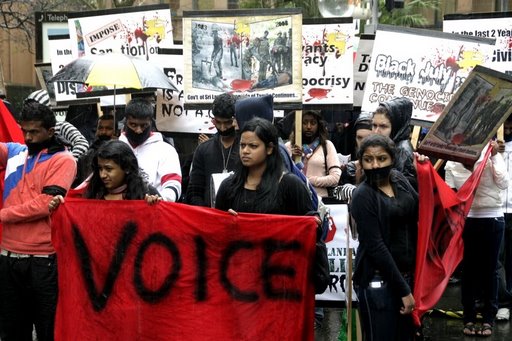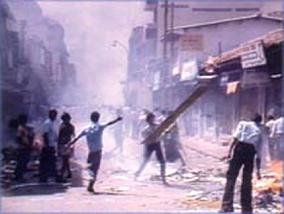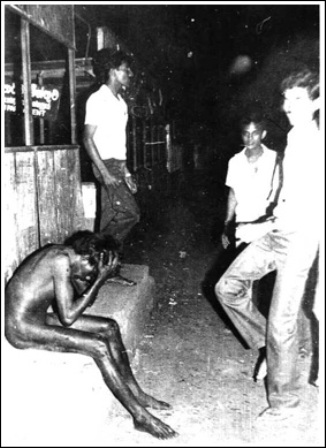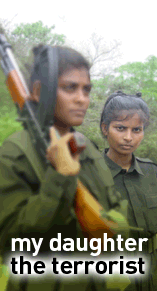Ilankai Tamil Sangam28th Year on the Web Association of Tamils of Sri Lanka in the USA |
|||
 Home Home Archives Archives |
Sri Lankan Tamils: Remembering Black Julyby Action in Solidarity with Asia and Pacific
Sri Lankan Tamils: Remembering Black July (pics added)
[Click on pictures for more photos] * The butchering of 52 Tamil political prisoners in Colombo's jail. Thirty-five were killed on July 25 by Sinhalese prisoners convicted of murder, rape and other heinous crimes who were handpicked by the warders, plied with liquor and let loose on the Tamil prisoners. On July 27, the survivors of the previous massacre were attacked and 17 prisoners killed. * The harrowing mass murder witnessed by a Norwegian tourist, Eli Skarstein, and her 15-year-old daughter Kristen. They watched helplessly as a mini-bus full of Tamils was set on fire by a Sinhalese mob. The doors were locked by the mob before setting the bus alight. More than 100 spectators watched as 20 Tamils were burned to death. Paul Seighart, chairperson of the British section of the International Commission of Jurists, who was sent to Sri Lanka by the ICJ on a fact-finding mission, wrote that the anti-Tamil violence of July 1983 was "a series of deliberate acts, executed in accordance with a concerted plan, conceived and organised well in advance". The Review, an ICJ publication, declared that the violence "amounted to acts of genocide". Sri Lankan industries minister Cyril Matthew was the mastermind behind the violence, arming the marauding mobs with electoral lists identifying Tamil households, and providing transport in government vehicles. Two years earlier the same minister was responsible for burning down the Jaffna Public Library, which held more than 95,000 books and manuscripts. The minister proved the German poet Heinrich Heine's prediction that people who burn books will end up burning people. Anti-Tamil violence became a common feature in the island's post-colonial political landscape. Between 1958 and 1983, there were seven pogroms, each more violent than the preceding one, designed to beat the Tamils into submission by killing, maiming, burning and destroying their property. Australia and Canada were the first countries to offer refuge to Tamil survivors of what became known as "Black July". Today, there are well over 60,000 Tamils in Australia, many of whom are survivors of Black July and their descendants. State-orchestrated and army-aided mob violence unleashed against the Tamils of Trincomalee in April 2006 was reminiscent of the way in which the events unfolded in July 1983. Entire Tamil families have been massacred by the Sri Lankan army, as was the case just prior to Black July. Open threats have been made by members of the National Sinhala Rights Party, which is part of the Sri Lankan ruling coalition, of "dire consequences" for Tamils living in the Sinhala South. Tamils have endured persecution and oppression far too long. It is time for them to be free and to be masters of their own destiny. Protest for Tamil self determinationRally against Sri Lankan governments state repression. Film Screening: My Daughter the Terrorist
|
||
|
|||



 Thursday, 6pm July 31 @ Resistance Centre, 23 Abercrombie St, Chippendale (Sydney)
Thursday, 6pm July 31 @ Resistance Centre, 23 Abercrombie St, Chippendale (Sydney)